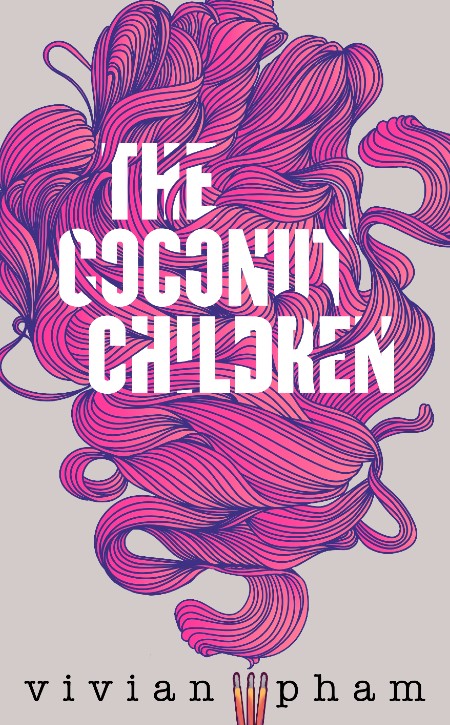
Finding your way through the many challenges that growing up demands is difficult at the best of times but even more, when the world in which all this growing up is taking place is almost inimical to this most universal of human transitions.
Sonny, the protagonist of Vivian Pham’s evocatively nuanced debut novel The Coconut Children, set in the late ’90s, is all too aware that making your way through life in those years is never an easy thing, especially when all the things that kids from reasonably functional families take for granted simply don’t exist for you.
16-year-old Sonny has been forced in many ways to grow up well before her time, effectively raising her younger 11-year-old brother Oscar who suffers from a form of brittle bone disease and who, as a result, has been forced to step back from life in ways unknown to other kids his age.
It is Sonny who takes him to and collects him from school, who makes sure he gets his vital (and much disliked by him) daily doses of milk, who gets him to sleep at night and who runs interference with their mother who is prone to almost wholly unpredictable mood swings.
Some days the woman who arrived by boat from Vietnam, traumatised by the perilous, pirate-plagued journey like so many fellow refugees, is all sweetness and light, the very best of motherhood, contentedly baking in the kitchen that is her delight and home.
“Bad neighbourhoods always had a way of forcing children to be more inventive but there was nothing to work with here; nothing a child could turn into a game, nothing to even suggest that anybody had ever grown up here. Yet Vince had.” (P. 24)
Other days, however, far too many to count sadly, her mother is a raging maelstrom of accusations and insults and self-pity, accusing her daughter of a lack of parental respect, demanding she do more to help around the house and haranguing her incredibly responsible daughter for crimes she has not even come remotely close to committing.
Life for Sonny is tough so it’s no surprise that she finds refuge in pulpy, sudsy historical romance novels, which she reads lying on her back in the backyard trampoline, a place where she is removed from the house and somewhat safe from her indiscriminate rages.
Her nascent sexuality and longing for some semblance of a normal teenage life also finds expression in her crushes on everyone from high school teachers to fast food workers, all unrequited of course, and all doomed to failure because, as Sonny herself is sage enough to realise, they are based on the flimsiest and most made-up on ridiculous premises.
She knows things aren’t ideal but there is no escaping them, even within a loving father who must battle his wife’s emotional swings in the same way as his children, and so she represses how lost and lonely she often feels, choosing to exist in a world of witty make-believe and repartee with best friend Najma, who faces her own battles with her mother who is convinced her daughter is departing from the family’s treasured Islamic faith.
Into this world of tamped-down desires and barely whispered desires for more, come Vince, Sonny’s very handsome next neighbour and onetime close childhood friend who, fresh from juvenile detention, is all characteristic swagger and destructive bravado, a reaction to an abusive childhood which he was ill-equipped to respond to in any kind of meaningful way.

No one is living any kind of ideal life, all of them facing pressures from parents whose response to past trauma is to continue the cycle down through their children, not out of any conscious desire to be cruel – Sonny’s mother is often riven with remorse after her anger-fueled outbursts – but simply because they don’t possess the tools to do things any other way.
The insightful beauty of The Coconut Children is the way it doesn’t for a second sugarcoat the stark realities of life in a poor neighbourhood such as the book’s setting of Cabramatta (Sydney) while also offering hope that these grim circumstances don’t have to be the end of someone’s experience.
As Sonny and Vince begin to find each other again, thanks in part to Sonny’s irrepressibly, sometimes drunk grandmother, they begin to discover that perhaps the solution to life getting better lies not so much in where they are but who they are with and who they, ultimately, really matter to.
There is a sweetness and light running through this wholly real novel, courtesy of the growing bond between Sonny and Vince, the latter not being anywhere near as tough and unfeeling as he makes out if only someone will give him a reason to act differently.
This comes courtesy not just of Sonny but a re-acquaintance with his mother and new 18-month-old sister Emma who brings out a tenderness and a willingness to do better than Vince never knew was there and which he desperately want to indulge.
While his childhood mates, Alex, Danny and Tim sink deeper into the unhealthy rhythms of the neighbourhood, accepting that things are the way they are and you might as well go with the flow, what choice do you really have, Vince, who is almost a demi-god among certain sections of neighbourhood, wants more.
“‘What’s wrong with you?’
‘What’s wrong with me?’ She pretended to look offended, then fund herself contemplating the question. ‘I don’t know, I’ve been asking myself the same thing for a while now.’
And they [Sonny and Vince] laughed again, both knowing they were not laughing only at themselves and at each other, but at everything that had ever happened to them.” (P. 241)
Pham beautifully explores what they means for him and how this newly-awoken desire to be better and to live a more fulfilling, meaningful life intersects with Sonny’s own desire to be something more than a battened-down survivor waiting for the end of a storm that never seems to stop roiling about her.
The Coconut Children is smart, sweetly amusing, sobering and profoundly moving as it quietly, and with a graceful elegance that mirrors the fact that even in the midst of violence, deprivation and loss, hope can be sustained and grow, explores what it means to seize back control in a world that seemingly offers little-to-no chance to do that.
The novel is possessed of clever, emotionally adroit storytelling whose full emotional impact sneaks up joyfully on you, whose simmering hope and a want, need, for more good and uplifting things that speak of living and not surviving, captivates as Sonny and Vince come alive, separately and together, and start making their way through the rest of their perilous growing up journey.
There are happy-ever-afters or anything as facile as a Hollywood ending in The Coconut Children but there is a verdant sense of life coming back from the brink, an unexpected sense, for both Sonny and Vince, that maybe they haven’t reached the end of their story and that there could be lying in wait that either thought there could be.
The Coconut Children is a gem – gorgeously and affectingly written, a book that doesn’t rush to get anywhere, mirroring instead the cadence and realities of real life, as realistic as they come and yet infused with an ever-growing sense that life can change, grow and be renewed and that this potent sense of renewal can happen even in the most unfavourable of circumstances where growing up, as the book’s tagline says, “can feel like a death sentence”, a sobering assessment that, the book hopefully shows, doesn’t have to be the end of the story.